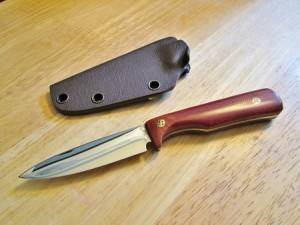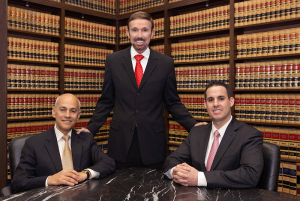The Manufacture, Sale or Possession of “Generally Prohibited” Weapons: California Penal Code Section 16590
Weapons laws can be confusing in California. Certain weapons are considered legal under California law, while some weapons become illegal when modifications are made, such as increasing the magazine capacity, or changing the ammunition type.
However, there is a class of weapons that are always prohibited under California law. These weapons, known as “generally prohibited” weapons, are illegal to manufacture, sell, or possess in California.
Generally Prohibited Weapons under California Penal Code 16590

California Penal Code 16590 provides a list of generally prohibited weapons. These weapons are defined as illegal in various sections of the Penal Code, but aggregated as a list under this section. The list includes all of the following weapons:
- Knives and Edged Weapons:
- Air gauge knives (PC Section 20130)
- Ballistic knives (PC Section 21110)
- Belt buckle knives (PC Section 20410)
- Cane swords (PC Section 20510)
- Concealed dirks or daggers (PC Section 21310)
- Lipstick case knives (PC Section 20610)
- Shobi-zue, or knives that are concealed within a staff, crutch, cane, or similar device that is exposed by a wrist movement or mechanical operation (PC Section 20710)
- Shuriken (a.k.a. “throwing stars”) (PC Section 22410)
- Writing pen knives (PC Section 20910)
- Melee Weapons
- Leaded canes, billy clubs, blackjacks, sandbags or sandclubs, saps and slungshots (PC Section 22210)
- Metal or brass knuckles (PC Section 21810)
- Nunchakus (a.k.a. “nunchucks”) (PC Section 22010)
- Firearms and Firearm Modifications
- Camouflaging firearm containers (PC Section 24310)
- Cane guns (PC Section 24410)
- Firearms that are not immediately recognizable as a firearm (PC Section 24510)
- Large-capacity magazines (more than 10 rounds) (PC Section 32310)
- Multi-burst trigger activators (PC Section 32900)
- Short-barreled rifles or shotguns (PC Section 33215)
- Unconventional pistols (PC Section 31500)
- Undetectable firearms (PC Section 24610)
- Wallet guns (PC Section 24710)
- Zip guns (PC Section 33600)
- Ammunition and Explosives:
- Flechette darts or ammunition made of flechette darts (PC Section 30210)
- Explosive bullets or bullets containing explosive agents (PC Section 30210)
- Concealed explosive substances, other than fixed ammunition (PC Section 19100)
- Metal military practice hand grenade, or metal replica hand grenade (unless permanently inert and not readily modifiable into a working hand grenade) (PC Section 19200)
The purpose of this list of generally prohibited weapons is to prevent people from carrying, selling, or creating instruments that are “short, easily concealed, and so weighted as to constitute effective and silent weapons of attack,” and “which are ordinarily used for criminal and unlawful purposes.”
Prosecution of Manufacture, Sale, or Possession of Prohibited Weapons Charges under PC 16590
In order for you to be convicted of violating PC 16590, the prosecution must prove beyond a reasonable doubt that:
- You possessed, manufactured, caused to be manufactured, imported into California, kept for sale, offered or exposed for sale, gave, lent, bought, or received an object that is a generally prohibited weapon;
- You knew that you possessed, manufactured, caused to be manufactured, imported into California, kept for sale, offered or exposed for sale, gave, lent, bought, or received the weapon; AND
- You knew that the object was an unlawful weapon intended for unlawful purposes or one that could be used for unlawful purposes.
Note that the prosecution is not required show that you intended to use the object as a weapon for unlawful purposes; only that you had knowledge that it could have been used in such a manner. Furthermore, the prosecution is not required to show that the item actually is in working condition to be used as a weapon.
If you are being charged with sale, possession for sale, or manufacture for sale of generally prohibited weapons, the prosecution must also prove that you intended to sell the weapon(s).
Punishment for Possessing, Manufacturing, or Selling a Generally Prohibited Weapon Under PC 16590

Possessing, manufacturing, or selling a generally prohibited weapon is a “wobbler” in California, meaning it can be charges as either a misdemeanor or a felony.
If you are convicted of a misdemeanor violation of PC 16590, you face a maximum sentence of 364 days in county jail, a fine of up to $1,000, or both jail and fine.
If you are convicted of a felony violation of PC 16590, you face 16 months, two or three years in county jail, a maximum fine of $10,000, or both jail and fine.
Defenses to Generally Prohibited Weapons Charges
If you have been charged with possession, manufacturing, or selling generally prohibited weapons under California Penal Code 16590, a skilled criminal defense attorney may be able to raise several defenses on your behalf. These defenses may include:
The object was not a generally prohibited weapon. The list of weapons under PC 16590 is very specific. Hence, if the object you possessed, sold, or manufactured does not meet the characteristics of any of those generally prohibited weapons, you should not be convicted of this crime.
For example, suppose you own an antique Queen Anne flintlock pistol. It has a rifled bore, and the barrel is 13 inches long. The prosecution will try to to prove that you had an “unconventional” pistol, but according to the law, an unconventional pistol is a firearm that does not have a rifled bore and has a barrel or barrels less than 18 inches in length and an overall length of less than 26 inches. Having a rifled bore means that this particular pistol does not fit the definition of a prohibited weapon, and therefore, you should not be convicted of this crime.

Lack of knowledge. The prosecution must show that you knew you possessed, manufactured, or sold the weapon and that you knew of its nature. If you did not know the weapon was within your possession, or had no knowledge that it could have been used as a weapon for unlawful purposes, you should not be convicted of this crime.
Suppose that after hip surgery, your mother needs a cane. You see a cane hanging in the window of a pawnshop, and decide to buy it. On your way home, a police officer stops you for speeding. He asks to search your car, and you agree. He picks up the cane, and while inspecting it, twists the handle, exposing a six-inch steel blade at the end of the cane. You had no idea it was there.
On these facts, the prosecution will attempt to charge you with possessing a shobi-zue, which is a generally prohibited weapon. However, you should not be convicted with knowingly possessing a shobi-zue because you did not have knowledge that you had a prohibited weapon in your possession.
You have a valid permit. Some of these weapon listed under PC 16590 can be made, sold, and possessed under limited circumstances. For example, nunchakus are generally prohibited weapons, but Penal Code 22015 permits the possession of nunchakus at any school that teaches self-defense. The same code also permits the manufacture and sale of nunchakus to martial arts schools.
Frequently Asked Questions on PC 16590
1. Can I be convicted of possession of a generally prohibited weapon if I was not physically carrying it?
In criminal law, possession can be actual or constructive. Actual possession means that the item was in your control at the time you were arrested, such as having the weapon in your hand or in your pocket. Constructive possession means that you had access to the area where the item was found and could exercise your control over that area. So, if the weapon were found in the trunk of your car or your home, you would have had access to the weapon, and could therefore be charged with having constructive possession of the generally prohibited weapon.
2. Is it legal for me to film a scene with a short-barreled shotgun for a movie?
Yes, but only with the proper permit. Penal Code 17720 allows for the use of short-barreled shotguns and rifles for the filming of a motion picture, television program, theatrical production, or video production. If you are over 21, you may obtain an entertainment firearms permit from the California Department of Justice, which allows you to possess firearms for use solely as a prop in a motion picture, television, video,
theatrical or other entertainment production or event.
3. If I remove the firing mechanism, can I carry a sawed-off shotgun to scare away attackers?
No. While your intention may be to display the weapon only for self-defense, the purpose of the law is to protect people from fear or coercion that the sight of such a firearm might cause. For example, suppose a robber brings an inoperable sawed-off shotgun into a convenience store. The clerk behind the counter does not know that the weapon cannot be fired, and so he still empties the register as ordered by the robber. Reducing this type of fear and coercion is one of the aims of the ban on these kinds of weapons.
Contact the Attorneys at Wallin & Klarich If You Are Being Charged With Violating PC 16590

Have you been arrested for making, selling, or carrying a generally prohibited weapon? If so, you will need an experienced and aggressive attorney to defend you against these charges. At Wallin & Klarich, our attorneys have over 40 years of experience successfully defending those charged with PC 16950 violations. We can help you, too. Contact us today for a free, no obligation phone consultation.
With offices in Los Angeles, Sherman Oaks, Torrance, Tustin, San Diego, Riverside, San Bernardino, Ventura, West Covina and Victorville, there is an experienced Wallin & Klarich criminal defense attorney near you, no matter where you work or live.
Call us today at (877) 4-NO-JAIL or (877) 466-5245 for a free phone consultation. We will be there when you call.

